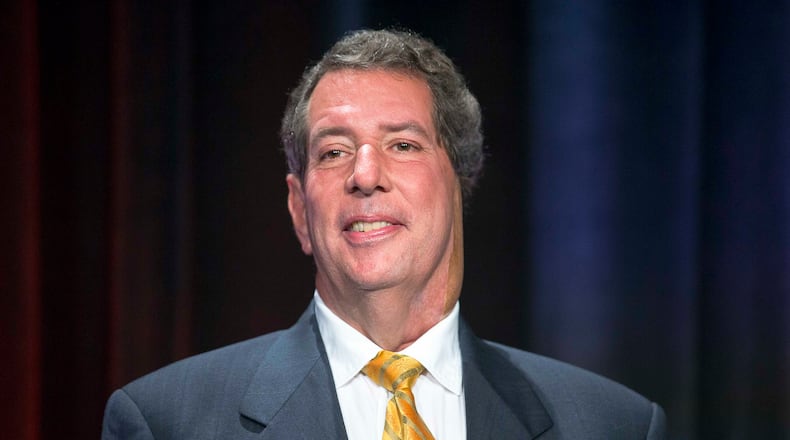Ted Metz will almost certainly not be Georgia’s next governor. Just in case, the Libertarian candidate has a plan for the day he takes the reins.
“Day One of being the governor would be to issue a proclamation to stop police and law enforcement from arresting people for possession of small amounts of cannabis for personal consumption,” he said during the Atlanta Press Club’s Loudermilk Young Debate Series, held this week at Georgia Public Broadcasting. “We also need to go through and teach our jurors how to be a good juror by acquitting people of a crime that has no victim. We can unclog the court system, and that’s the best thing I can do.”
Much of his appearance served as a proxy for Democrat Stacey Abrams and Republican Brian Kemp to clobber each other, and in his closing statements Metz billed himself as a potential spoiler who could force a runoff, rather than Gov. Nathan Deal’s probable successor.
So who is he?
Edward Tecumseh Metz, 60, is retired from insurance and finance. He served in the U.S. Navy and studied organic chemistry at the University of Georgia, risk management and insurance at Georgia State University, and nursing at Georgia Perimeter College. He and his family live in Mableton.
Elected last year as chairman of the Libertarian Party of Georgia, Metz was the party’s candidate for state insurance commissioner in 2014, receiving more than 86,000 votes, or 3.43 percent. In that race, incumbent Ralph Hudgens easily prevailed against Democrat Liz Johnson with nearly 55 percent of the vote.
The current governor’s race, on the other hand, is much closer.
“I’m going to state emphatically, there will be a runoff,” said Metz, who might consider an endorsement if that happens. “I’m going to sit down with both candidates. Based on their responses and the sincerity with which they express them, I will let my opinion be known.”
The son of a U.S. Air Force pilot, Metz grew up all over the country and valued the diversity of military-base communities. In a 27-point comparison between himself and the other two candidates on his website, tedmetz.com, he notes he's the only one who served in the military. The self-proclaimed government watchdog makes frequent visits to the Gold Dome during legislative sessions to sit in on various proceedings.
“We can pick apart either party, but when it comes down to it, government is Republicans and Democrats,” he said. “When they vote together on expanding government and increasing taxes, how is there any difference between the two parties?”
Unlike the millions pouring in to the Abrams and Kemp coffers, Metz’s most recent report shows contributions of about $5,800, including a loan of about $1,900 to himself. The two mainstream candidates have made out-of-state money an issue, with Team Kemp noting Abrams’ fundraising trips to California and New York and appearances with U.S. Sens. Elizabeth Warren of Massachusetts and Cory Booker of New Jersey. Kemp’s detractors counter by pointing out the recent visit from U.S. Sen. Marco Rubio of Florida, to say nothing of Kemp’s hearty support from the White House.
Metz’s out-of-state fundraising includes a $1 contribution from a busboy in Alabama.
“My campaign is a grassroots effort,” Metz said. “The amount of money thrown into politics is an indication of the favoritism they’re going to show after they are elected, all the special favors we call crony capitalism.”
Metz’s campaign calendar has been far less packed than that of either Abrams — who has attracted support from celebrities such as Yung Joc and John Legend — or Kemp, who recently completed a 27-stop tour of mostly South Georgia and Middle Georgia. Metz holds regular online sessions cleverly branded as “Ted Talkz.”
His debate appearance had him briefly trending on Twitter, where he has about 400 followers, and he used the event to share his views on contentious topics such as immigration.
“I don’t see immigration as a problem as other people see it. We need more immigration in America to build the strength of America,” he said during the debate. “If we don’t have more people in Georgia and the United States to pay into our Medicare and Medicaid systems, those systems will collapse.”
Metz also advocated passionately for industrial hemp. Not to be confused with marijuana, it is derived from the plant species Cannabis sativa and used in a variety of industrial and consumer products. Production is controlled under drug enforcement laws, and growers must secure U.S. Drug Enforcement Agency permission, according to the Agricultural Marketing Resource Center.
“Industrial hemp is a product that can create jobs in Georgia and create prosperity. There are 25,000 different uses of industrial hemp, from fiber to food to fuel to industrial chemicals,” Metz said in response to a question about agriculture. “Anything that oil can do, hemp can do in a carbon-negative fashion. We can actually reduce the carbon problem we have with global warming by using hemp to suck the carbon dioxide out of the air. Everything can be done with hemp.”
Later in the debate came a question on boosting rural Georgia. The answer, he said, was clear: “We’re going to start again with industrial hemp, allowing farmers to grow a cash crop that can save the environment, save the soil.”
The night after the debate, Jennifer and David Jones of Dunwoody were inspired to head to a Metz campaign event at a Mellow Mushroom.
“After the debate I tried to gobble up all I could” about him, Jennifer Jones said. She and her husband are both Georgia Tech graduates working in engineering and software. They are interested in green technology and are turned off by both the red and blue contenders.
“We thought the Republican and Democrat candidates were, perhaps, more eloquent,” David Jones said. “But they seemed more interested in fighting and cutting each other down than finding solutions.”
WHAT’S NEXT
Democrat Stacey Abrams, Republican Brian Kemp and Libertarian Ted Metz are scheduled to debate again at 5 p.m. Nov. 4. It will be aired live on Channel 2 and streamed via WSBTV.com.
About the Author
Keep Reading
The Latest
Featured




